|
|
Reviewed by Glenn Erickson
International co-production deals can create obstructions for the release of certain unlucky movies. Wim Wenders' German film Until the End of the World did poorly on its American release in 1991. When Wenders later expanded it into a much longer 3-film version, the American distributor Warners blocked its distribution. Did something similar happened to Fox's 1969 The Sicilian Clan? It was filmed in two separate versions, a multi-lingual European original and a badly dubbed, shorter cut for America. A huge hit overseas, The Sicilian Clan didn't make a ripple when given a spotty release here in 1970. It hasn't been seen much here since.
I saw it twice back then. An Air Force Base theater showed the International version, in French, Italian and English with subtitles, to a fascinated crowd that applauded at least twice during the screening. When I rented the movie from Films Incorporated the next year, they sent me the American version, in which everyone was awkwardly dubbed and nothing seemed quite as exciting. Fox produced the English-language version because they knew that American audiences wouldn't sit through subtitles. But the dubbing robbed the picture of any feeling of authenticity and naturalness.
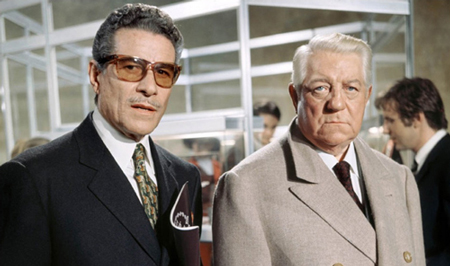
It has taken until now for The Sicilian Clan to find a home video release, and Savant had to reach overseas to get it. This new Fox-Europa disc is pretty much everything one could hope for; it's my idea of perfect nostalgic holiday picture.
Paris, 1970. Notorious thief and cop killer Roger Sartet (Alain Delon) is sprung from a prison truck by the Manalese Gang, a highly-organized group of brothers following orders from their father, family patriarch Vittorio Manalese (Jean Gabin). The Manaleses own a pinball machine company, but Vittorio indulges in profitable crimes to allow him to buy land back in Sicily, so he can return to a glorious retirement. Roger's cellmate in prison is a security systems expert and has given him the alarm layout for an exhibition of fine jewelry. Interested in a deal for a new heist, Vittorio flies to Rome to check it out for himself, with his New York Mafia buddy Tony Nicosia (Amadeo Nazzari of The Nights of Cabiria). Working overtime to recapture Sartet, the dogged Inspector Le Goff (Lino Ventura) leans hard on Roger's sister Monique (Danielle Volle), passport forgers and other underworld contacts. Sartet risks a night with a prostitute. But sex causes even more trouble when the French thief develops a liking for Jeanne (Irina Demick), the wife of one of the Manalese sons. What with the Sicilian code of honor and all, should the be caught there will be hell to pay.
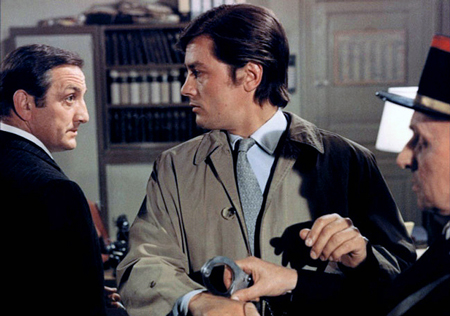
The Sicilian Clan must have been a nostalgic item for the massive audience it attracted in France, as it starred three legends of French thrillers. Jean Gabin was a revered institution, a veteran of some of the greatest pictures by Jean Renoir and Julien Duvivier. Alain Delon's career was barely a decade old, yet he was the country's hottest male sex symbol, topping even Jean-Paul Belmondo. Not known internationally, Lino Ventura represented the best in French crime and "serie noire" thrillers, having starred in terrific shows like Louis Malle's Elevator to the Gallows, Claude Sautet's Classe tous risques and Jean-Pierre Melville's Le deuxième souffle. Gabin was the grand old man of the three -- Ventura's first role was in a Gabin picture, Jacques Becker's Touchez pas au grisbi.
Made by the locally popular but uneven Henri Verneuil (Greed in the Sun), The Sicilian Clan is slick, expensive and perhaps a little too conventional. The film's ambition was to crack the American market. At one point in the excellent documentary included on the disc, the producer says that Verneuil stressed giving the film a snappy 'American pace'. The picture has more than its share of impressive thriller set pieces and dramatic confrontations, but it still has the tempo of a less-rushed French movie.
The three stars exhibit different styles of Gallic cool. Jean Gabin stays in his pinball factory, with its apartments right above the work areas. He's the center of all Manalese activities, with his sons obedient and on task at all times. The family eats together and watches TV together. As the only outsider, Jeanne can barely take it -- it's like living in the 19th century. Alain Delon's criminal Sartet faces down the police as he would in his Jean-Pierre Melville pictures, calmly listening to the charges against him and quietly sticking to his denials. Sartet does have a soft spot for his sister Monique, who suffers when she realizes that Inspector Le Goff's men are watching her at all times. Lino Ventura's relentless detective is a completely stock character. He runs a tight outfit. We can feel the tension among his men when he's displeased, which is most of the time. The gag of having Le Goff trying to quit smoking can't possibly have been fresh, even in 1970. Just the same, Ventura's presence overcomes all obstacles -- he's an immediately likeable pro.
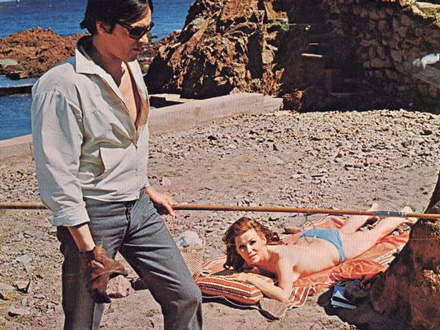
The movie is lavish by the standards of French genre filmmaking of the time, with most of the large, interesting interiors being beautifully constructed sets. Jacques Saulnier's art direction does go a bit too far with the color coordination now and then, especially in a scene where every accent including Irina Demick's tight outfit, seems to be bright orange. The shoot ranges from hotels to airports to a large prison and a convincing police headquarters. In the best staged action scene, the cops close in on a brothel, getting as close as one door away from their quarry Sartet, who is still in his underwear. It's like the two-gun situation in Don Siegel's Madigan, except that it resolves in an impressive, hair-raisingly credible stunt.
Like icing on the cake is the slick music score by Ennio Morricone, which alternates between a mournful main theme and an exciting action riff for transitional cues. As with his western scores of the time, Morricone uses odd noises as part of the score, in this case "boing" sounds. The composer's most unusual scoring choice is a dynamic power moment for a seduction on a beach. Delon's crook is killing a large eel he's caught by pounding it against a rock. This display of brutality is noticed by Jeanne, who has chosen to sunbathe nude only a few yards away. It's the scene in which everyone's plans go radically wrong. (image just above.) 1
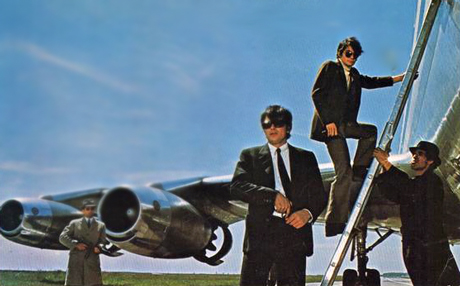
The Sicilian Clan is perhaps a little too methodical and literal for today's tastes, in that escapes and violent confrontations are covered in real-time detail. Today's action shows either pile on layers of incident and jeopardy (to cartoon excess) or dispense with the suspense stuff and rush forward to the next scene. The film eventually builds to a major crime that's spelled out in full detail, as a jet plane carrying a fabulous treasure travels from Rome to Paris and from there to New York. In 1970 the Manalese's crime seemed utterly fantastic. Who would ever be so audacious as to pull such a daring, outrageous stunt? Today our innocence has been overtaken by history in a way that might make some audiences see The Sicilian Clan as an uncomfortable experience. For those who have seen the movie, this thought thread continues in a SPOILER footnote.
Fox-Europa's Blu-ray + PAL Region 2 DVD of The Sicilian Clan is just the kind of import disc Americans go for: although the supplementary DVD copy is Region 2 PAL encoded, the main Blu-ray is All-Region. It contains both the International version (2 hours 5 minutes) and the American version (7 minutes shorter). The extras on the Blu-ray are also in HD, and so will play on normal American players as well.
The transfer quality is A+ all the way; the film looks brand-new, with rich color and impressive contrast. Director Verneuil hits us with a few Leone-like extreme close-ups of eyes, which really pop. There's some flashy nudity in the cop scenes, and that enticingly attractive nude scene on the beach is a definite highlight.
Completing the good news, both versions of the film have English subtitles, although no subs appear in a few sequences in which people are speaking English. This mostly happens at the end, when an American woman at the Paris airport is trying to find out what happened to her husband.
The two versions of the film use entirely different film takes, although they are edited very similarly. Americans that have seen the film on cable TV (miserably pan-scanned, mind you) are basically looking at the 2nd-best takes throughout, and dialogue scenes where actors like Gabin are working phonetically and have no sense of English-language speech pacing. In the International version (called inédite on the disc package), what language people speak is an important issue with their origin and character. For instance, a Canadian confederate (Sydney Chaplin) speaks French and English, but not Italian. This international aspect is lost in the mechanical dialogue of the English version.
Fox-Europa doesn't skimp on the extras. A four-minute intro to the film is given by director-writer Fred Cavayé. A newsreel of the French premiere is included as well. Very welcome is a handsomely produced, informative making-of docu called La Legende du Clan (60 min). We hear the entire story of the stars, the director and the difficulties with the American studio and Darryl Zanuck from the producer, the assistant director, the designer and the son of Henri Verneuil, who passed away in 2002. Yes, it's true -- the Fox/Zanuck deal required the film to star Irina Demick. She was Zanuck's paramour of the 1960s and a memorable presence in The Longest Day and Those Magnificent Men in Their Flying Machines, where she plays seven separate roles.
Fox-Europa presents the feature in a book-like folding package, with a souvenir booklet. The two discs, one Blu-ray and one DVD, come in yet another kind of plastic disc holder, that at first needs special attention to operate.
On a scale of Excellent, Good, Fair, and Poor,
The Sicilian Clan Blu-ray rates:
Movie: Very Good ++
Video: Excellent
Sound: Excellent
Supplements: Making of Docu, French premiere newsreel
Deaf and Hearing-impaired Friendly?
YES; Subtitles: English
Packaging: 1 Blu-ray and 1 DVD in book holder with color souvenir booklet.
Reviewed: December 15, 2013
Footnotes:
1. Jeanne's eventual punishment seems all wrong in terms of human rights, like the horribly misogynistic practices in some Middle Eastern and sub-Asian countries. The Sicilian Clan simply accepts it as part of 'the family tradition'.
Return
2. Briefly stated, the big crime (SPOILER -- SPOILER) in The Sicilian Clan is the hijacking of a commercial airliner en route to New York City. By 1969 there had been political hijackings, including a major episode engineered by Israeli Chief of Staff Moshe Dayan and a small plane hijacked by refugees escaping Communist Budapest. The first plane hijacked to Cuba occurred in 1962. But the use of hijackings was on the rise in the late 1960s.
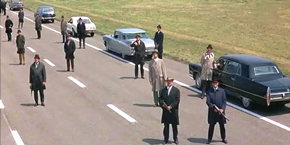
What made The Sicilian Clan so impressive in 1970 is that gangsters committing a crime for profit think nothing of placing a hundred lives in jeopardy. At the last moment, the Manalese's replacement pilot steers the plane away from La Guardia, and puts it down on a New Jersey Freeway not yet open to the public. A caravan of mob cars awaits to spirit away the hijackers and their loot. This audacious super-crime elicited spontaneous applause from the audience, as if it were a set piece in a James Bond movie: Emilio Largo might pull a stunt like this. The difference is that the air heist seemed entirely believable, a terrible but brilliantly conceived and executed super-crime.
Airplane hijackings haven't been amusing for a long time now. Even when The Sicilian Clan was in the theaters, a shoot-out occurred on a domestic flight. The malign adventures of D.B. Cooper (mythologized) and Carlos (feared and loathed) would follow. The movie shows the hijackers able to take over the plane just by walking on board with concealed weapons and strolling forward to the cockpit, which has no secure door.
The show may become momentarily uncomfortable for viewers especially sensitive to the 9/11 issue. On the New York approach, even with the aerial views geographically off, it is chilling to see the plane divert radically from La Guardia and fly low over Manhattan, with armed men in charge. The passengers and air traffic controllers have no idea where it is being taken. When Le Goff is finally told what happened, he is appropriately speechless.
Return

DVD Savant Text © Copyright 2013 Glenn Erickson
See more exclusive reviews on the Savant Main Page.
Reviews on the Savant main site have additional credits information and are often updated and annotated with reader input and graphics.
Also, don't forget the
2011 Savant Wish List.
T'was Ever Thus.
Return to Top of Page
|

